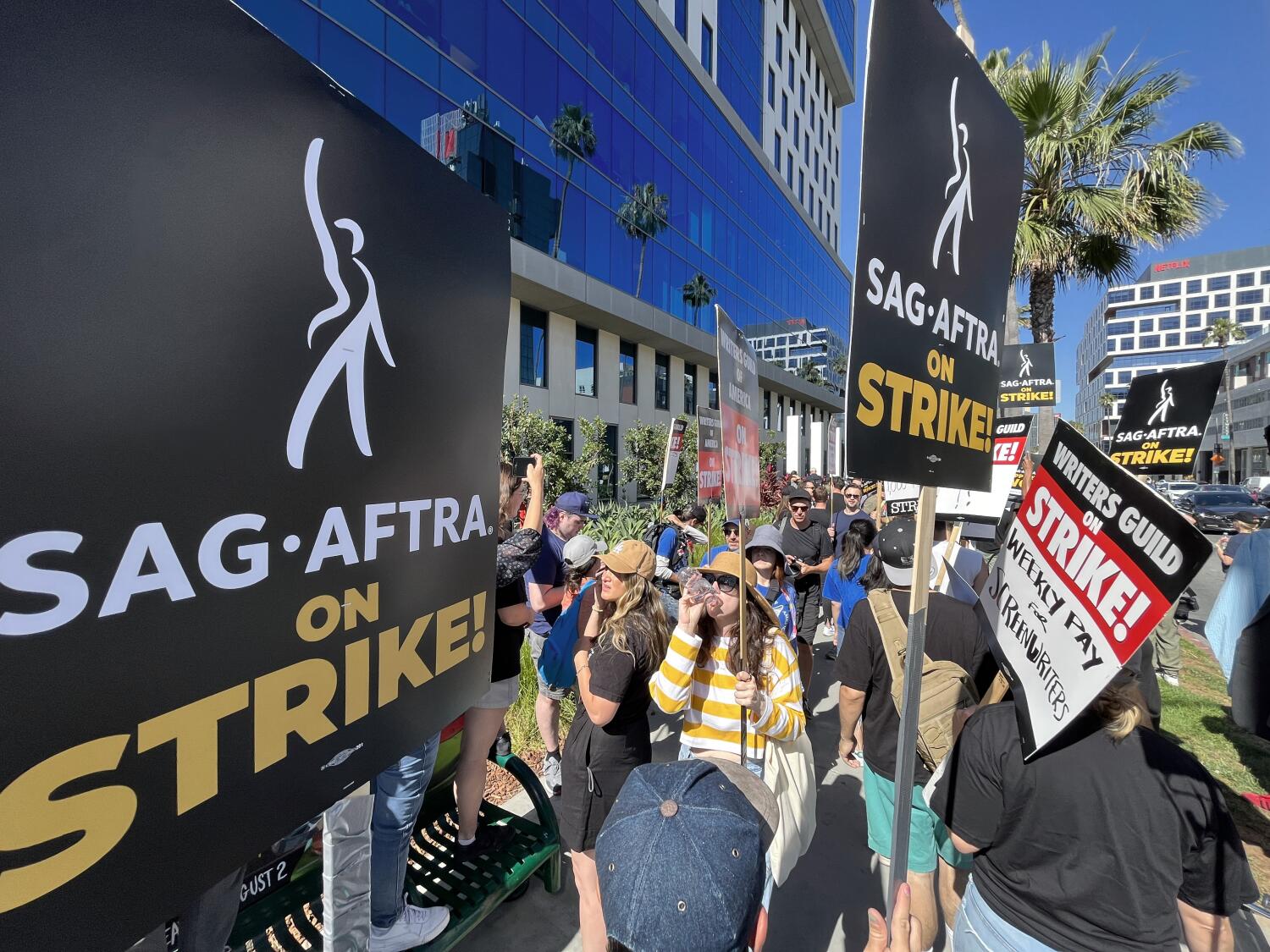
Leaders of SAG-AFTRA and the major Hollywood studios are wrapping up their first week of negotiations since the 160,000-member performers union went on strike in mid-July, but the sides aren’t yet close to a deal, sources familiar with the talks said Friday.
The two groups met three days this week at SAG-AFTRA’s headquarters on Wilshire Boulevard in Los Angeles, and have agreed to resume talks on Monday.
The sessions have been productive, these sources said, providing an opportunity for ranking company executives to hear directly from union leaders, including SAG-AFTRA President Fran Drescher, who has been sharply critical of industry leaders.
Friday marked the 85th day of SAG-AFTRA’s strike against the major entertainment companies.
“This is the fight for our lives — and for our art,” actor Sonal Shah (“Four Samosas,” “Scrubs”) said earlier this week, while picketing outside Amazon Studios in Culver City. “There is so much strength, and so much power when we come together in solidarity.”
SAG-AFTRA called the strike July 13 after five weeks of bargaining with the Alliance of Motion Picture and Television Producers, which represents the big companies.
The union is seeking greater compensation, higher residuals and greater protections against the use of artificial intelligence to replicate a performer’s image and voice.
In addition, SAG-AFTRA has demanded that its members share in revenue generated by streaming services, saying “the current business model has eroded our residuals income.” Actors also want rules governing self-recorded auditions, saying producers have shifted that expense to performers and it has become a costly burden.
Top executives of the major media companies, including Walt Disney Co. Chief Executive Bob Iger, Warner Bros. Discovery CEO David Zaslav, Netflix Co-CEO Ted Sarandos and NBCUniversal Studio Group Chairman Donna Langley, have attended this week’s sessions along with AMPTP President Carol Lombardini. Drescher and SAG-AFTRA chief negotiator Duncan Crabtree-Ireland have represented the union.
The ongoing talks and the involvement of Hollywood’s top brass signals a desire on both sides to resolve the strike which, combined with the recently settled writers’ strike, has caused widespread disruption to the film and TV business. The pain has been felt throughout the industry, including for tens of thousands of actors and crew members who remain out of work.
Late last month, the four top executives helped negotiate a tentative deal with the Writers Guild of America, ending that guild’s 148-day strike. WGA members are voting on whether to ratify the agreement; the voting period closes Monday.
Both sides have been motivated to end the ongoing actors’ strike.
Companies are looking to mitigate the damage and disruption to their network television seasons and 2024 theatrical movie plans. Without actors to market movies, several studio releases this summer under-performed expectations.
A Guggenheim Securities research report, citing MediaRadar, said the strikes have already cost the TV networks $1.6 billion in lower advertising spending.
Depending on the length of the SAG-AFTRA strike, scripted “comedies and dramas could begin rolling out as early as January,” the Guggenheim Securities analysts wrote in the report, which noted that some networks were planning shortened seasons with 10 to 15 episodes of their returning shows. Typically, network shows have as many as 22 episodes in a season.
Talks are going slowly and the two camps have yet to resolve key areas of conflict, including the use of artificial intelligence, said the knowledgeable sources who were not authorized to comment publicly.
There are fears that algorithms and trained programs might be used to wipe out background actors. For hundreds of actors, background work provides a key source of employment as they work to build their profiles and gain attention.
Shah, the striking actor, said she was optimistic the strike would end with gains for union members.
“This is going to lead to a better future for our generation and for generations to come,” Shah said.
Fellow actor Parvesh Cheena (“The Mandalorian,” “Sometimes I Think About Dying”) said striking workers have already succeeded in demonstrating their importance to the industry.
“We have proven that artistic workers — be it the writer, the director or the actor — deserves their share of the profits in the industry that we all participate in,” Cheena said.
Times staff writer Wendy Lee contributed to this report.

